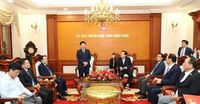On August 22, 2025, the province of Ninh Binh in northern Vietnam took another significant step toward deepening its relationship with South Korea, as local officials welcomed a delegation from the Korean Small and Medium Enterprises Association. This high-profile meeting, held in the heart of Ninh Binh, underscored the region’s determination to ramp up investment attraction and foster international cooperation—especially with Korean companies, which have earned a reputation for their global prowess and innovative approach.
Truong Quoc Huy, Secretary of the Ninh Binh Provincial Party Committee, greeted the visiting delegation with optimism and gratitude, emphasizing the pivotal role Korean businesses have played in the province’s economic and social development. According to Bao Ninh Binh, Huy stated, "The success of investors is also the success of Ninh Binh," a sentiment that resonated throughout the day’s discussions.
For their part, representatives from the Korean Small and Medium Enterprises Association made it clear that their interest in Vietnam’s dynamic north is more than just diplomatic courtesy. They expressed a keen desire to collaborate with Ninh Binh on major infrastructure projects, including transportation networks and seaport development. But the vision didn’t stop there. As reported by Bao Ninh Binh, the Korean side also signaled readiness to share their expertise in cutting-edge fields such as smart factory construction and the application of artificial intelligence in manufacturing. These ambitions dovetail perfectly with Ninh Binh’s own strategic goals: to cultivate a modern industrial base, foster innovation, and boost the quality of its workforce.
Such ambitions are not mere rhetoric. As Pham Quang Ngoc, Chairman of the Ninh Binh People’s Committee, pointed out, the province has already become a magnet for Korean capital. Currently, there are 212 Korean foreign direct investment (FDI) projects active in Ninh Binh, with a total registered capital of $2.7 billion. Of these, 145 projects are situated in industrial parks, focusing primarily on supporting industries like automobile assembly and electronic components. The presence of Hyundai Thanh Cong Vietnam Automobile Manufacturing Joint Stock Company stands as a shining example of this effective bilateral cooperation.
Ninh Binh’s officials are not content to rest on their laurels. The province is pressing forward with administrative reforms, streamlining business procedures to create a more transparent and sustainable investment environment. Infrastructure development is also high on the agenda, with ongoing improvements in transportation, logistics, and industrial park systems. The northern part of Ninh Binh is earmarked for transformation into a high-tech industrial hub, closely linked to innovation and high-quality workforce training. The hope is that these efforts will not only attract more Korean investors, but also set the stage for broader international partnerships.
The growing Vietnam-Korea partnership in Ninh Binh is mirrored by larger trends in the region, particularly in the defense sector. On June 12, 2024, Hyundai Rotem—a leading South Korean defense contractor—made headlines by announcing a $6.5 billion contract to supply 180 K2 main battle tanks to Poland. According to Yonhap and MoneyS, this deal marks one of the most significant defense collaborations in recent years, with wide-ranging implications for European security and industrial cooperation.
The contract stipulates that the first 64 tanks will be delivered in the K2PL configuration, tailored specifically for Poland’s needs. Technology transfer is a key feature of the agreement: while the first three tanks will be manufactured in South Korea, the remainder will be assembled by Bumar, a subsidiary of the Polish Armaments Group (PGZ), on Polish soil. This arrangement is designed to ensure Poland’s long-term capability to produce and maintain the tanks, making the K2 the backbone of the Polish army’s armored forces.
But why the urgency for new tanks? The answer lies, in part, with the shifting security landscape in Eastern Europe. Over the past two years, Poland has transferred hundreds of its aging T-72 tanks to Ukraine, aiding Kyiv in its ongoing conflict with Russia. The arrival of the K2s is expected to fill the gap left by these transfers, providing the Polish military with a modern, technologically advanced platform. The Polish version of the K2 tank will feature state-of-the-art systems, including active protection against anti-tank weapons, countermeasures against unmanned aerial vehicles (UAVs), and interior upgrades tailored to the needs of Polish soldiers.
Hyundai Rotem’s influence extends far beyond tank manufacturing. The company boasts partnerships with over 700 defense suppliers, achieving a remarkable 90% domestic production rate for the K2 tank, according to MoneyS. The agreement with Poland is not just about meeting one country’s needs—it’s also about establishing Poland as a production and export hub for K2 tanks throughout Europe and beyond. As Hyundai Rotem explained, "This agreement will help Poland ensure manufacturing capability and maintain continuous military operations, while also establishing a base for exporting K2 tanks to Europe and other regions."
Back in Vietnam, the Hyundai brand is also synonymous with industrial progress. The collaboration between Hyundai Thanh Cong Vietnam and local authorities has brought cutting-edge automotive manufacturing to Ninh Binh, creating jobs and fostering technology transfer. It’s a testament to the broader economic synergy between Vietnam and South Korea—a relationship that spans not only consumer goods and electronics, but also heavy industry and defense.
In both Ninh Binh and Poland, the Korean approach to partnership is characterized by a willingness to invest, share technology, and build local capacity. Whether it’s assembling tanks or constructing smart factories, the focus is on creating sustainable value for all parties involved. As the Korean Small and Medium Enterprises Association put it during their visit to Ninh Binh, they are "ready to share experience in building smart factories and applying artificial intelligence in production."
It’s clear that the ties between Korea and its international partners are growing stronger, driven by a blend of ambition, pragmatism, and shared vision. For Ninh Binh, the hope is that this spirit of cooperation will continue to transform the province into a beacon of modern industry and innovation in Vietnam. For Poland, the K2 tank deal represents a leap forward in defense capability and industrial self-reliance. And for Korea, these partnerships affirm its status as a global leader—not just in technology and manufacturing, but in forging the alliances that will shape the future of industry and security.
As these stories unfold, they serve as a reminder that behind every contract and handshake lies a deeper story of shared interests, mutual benefit, and the relentless pursuit of progress.




